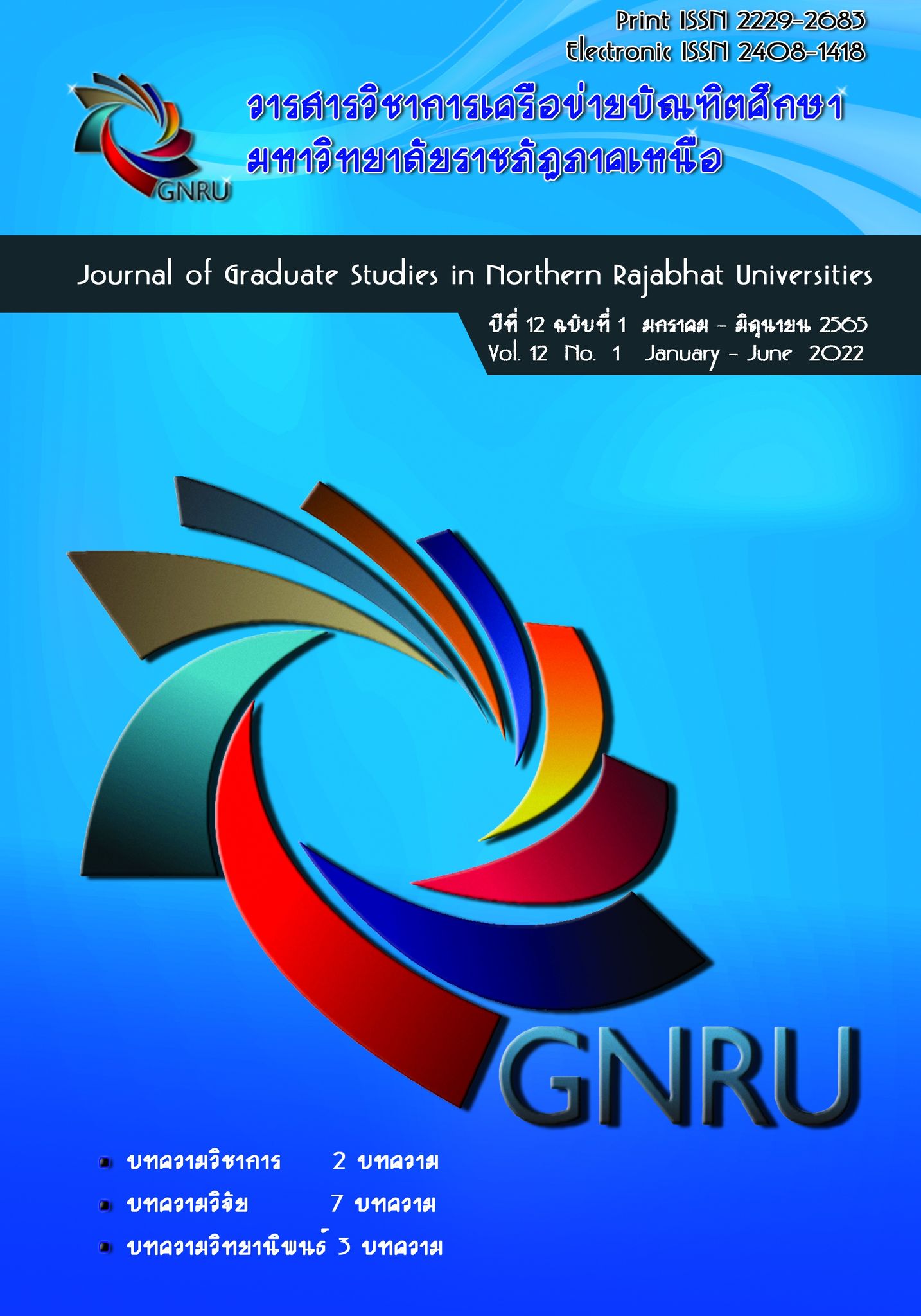บทบาทของผู้ปกครองกับการพัฒนาทักษะ EF (Executive functions skills) ของเด็กปฐมวัยในสถานการณ์แบบ New Normal The parents’ role EF (executive functions skills) development of early childhood in new normal situation
Main Article Content
Abstract
The parents’ role EF (executive functions skills) development of early childhood in new normal situation. The purposes to develop EF (executive functions skills) of early childhood for achievements in new normal living. This is in order to illustrate the purpose and guidelines to educate early childhood related to the after covid-19 pandemic. Children need to develop more in physical, emotional, social and cognitive terms for them to be able to adjust and survive in this new normal situation. EF (executive functions skills) are related prefrontal cortex skills to manage and control emotions, cognition and performance to fulfill its aims. These skills are very important for early childhood in the new normal situation in which they should be educated to survive and adjust in living. This is part of a significant transition for the foundation of the thinking and efficiently right decisions made by early childhood. The EF (executive functions skills) composition of early childhood should be developed and promoted to recognize restraint and flexible thinking. The parents’ role is very important for early childhood EF (executive functions skills) development in the New Normal situation, where they need to give love and maintain a good relationship with their children. For EF (executive functions skills) to be completely improved in early childhood, it should include the children’s participation and positive reinforcement. This applies especially if their behavior is bad so it needs to be improved. Understanding children, their feeling and the learning to take part in school while there is a calm environment at home. These practices should be consistent and respect each other and to have authority in leadership. EF (executive functions skills) development in early childhood need to be made for living adjustment in the new normal situation whit cooperation of family institution. In these ways Thailand can overcome the obstacles and achieve these ambitious aims.
Article Details
References
จุฑามาศ แหนจอน. (2560). การพัฒนาหน้าที่บริหารจัดการของสมองสำหรับวัยรุ่นโดยหลักสูตรการ
เรียนรู้แบบบูรณาการ. วารสารศึกษาศาสตร์ มหาวิทยาลัยบูรพา, 28(2).
ฉันทนา ภาคบงกช. (2531). เอกสารประกอบการศึกษาวิชาการศึกษาสำหรับผู้ปกครอง. กรุงเทพฯ : มหาวิทยาลัยศรีนครินทรวิโรฒ ประสานมิตร.
โชคชัย บุณยะกลัมพ. (2563). New normal school? โรงเรียนของไทย จะไปทางไหนในยุคโควิด-19.
วันที่สืบค้นข้อมูล 8 มิถุนายน 2563, เข้าถึงได้จาก https://www.matichonweekly.com/in-
depth/article_305428.
นวลจันทร์ จุฑาภักดีกุล. (2559). เอกสารประกอบการอบรมเรื่อง การใช้แบบประเมินพัฒนาการด้าน
การคิดเชิงบริหารในเด็กปฐมวัย.ศูนย์วิจัยประสาทวิยาศาสตร์. สถาบันชีววิทยาศาสตร์โมเลกุล
มหาวิทยาลัยมหิดล.
นพวรรณ ศรีวงศ์พานิช. (2556). ตำราพัฒนาการและพฤติกรรมเด็ก เล่ม 3 การดูแลเด็กสุขภาพดี ในบทที่ 8 การส่งเสริมพัฒนาการ. กรุงเทพฯ : บริษัท บียอนด์ เอ็นเทอร์ไพรซ์ จำกัด.
ประเสริฐ ผลผลิตการพิมพ์. (2560). เรื่อง EF จะพาเด็กไทยออกจากวิกฤตอย่างไร เอกสารการบรรยาย
พิเศษในงานประชุมวิชาการ EF Symposium 2017 สมองเด็กไทย รากฐานทุนมนุษย์เพื่ออนาคต
ประเทศ. ณ สำนักงานกองทุนสนับสนุนการสร้างเสริมสุขภาพ (สสส.).
พัชรา พุ่มพชาติ.( 2560). ผลการใช้ชุดฝึกอบรมผู้ปกครองเรื่องการสร้างวินัยเชิงบวกผ่านกระบวนการมี
ส่วนร่วมของผู้ปกครองที่มีต่อวินัยในตนเองและความเชื่อมั่นในตนเองของเด็กปฐมวัยในศูนย์
พัฒนาเด็กเล็ก สังกัดองค์กรปกครองส่วนท้องถิ่น อำเภอเมือง จังหวัดชัยนาท. กรุงเทพฯ:
สถาบันวิจัยและพัฒนา มหาวิทยาลัยราชภัฏจันทรเกษม.
มานิตา ลีโทชวลิต อรรถนุพรรณ และ อรกานต์ เพรชรคุ้ม. (2558). เทคโนโลยีกับเด็กปฐมวัยใช้อย่างไรให้
พอดี. วารสารศึกษาศาสตร์ มหาวิทยาลัยศิลปากร,13(1).
ราชบัณฑิตยสภา. (2563). New Normal คืออะไร. วันที่สืบค้นข้อมูล 8 มิถุนายน 2563, เข้าถึงได้จาก
https://www.facebook.com/surapol.issaragrisil/posts.
รักลูกกรุ๊ป. (2560). ทักษะสมองเพื่อจัดการชีวิตสู่ความสำเร็จ. วันที่สืบค้นข้อมูล 8 มิถุนายน 2563, เข้าถึง
ได้จาก http://www.raklukesociallearning.com
วีระศักดิ์ ชลไชยะ. ( 2561). ผลของสื่ออิเล็กทรอนิกส์ผ่านจอต่อเด็กและวัยรุ่น = Effects of electronic
screen media on children and adolescents. กรุงเทพฯ : บียอนด์เอนเตอร์ไพรซ์
อนันดา ดีเวลลอปเม้นท์ จำกัด (มหาชน). (2563). ปรับตัวรับ New Normal ชีวิตเปลี่ยนหลังโควิด-19.
วันที่สืบค้นข้อมูล 8 มิถุนายน 2563, เข้าถึงได้จาก https://www.ananda.co.th new-normal-covid-19.
Anderson. (2002) . Assessment and development of Executive Function (EF) during
childhood. Child Neuropsychology, 8(2)
Bunge, S. A., E. Hazeltine, M. D. Scanlon, A. C. Rosen and J. D. Gabrieli (2002). "Dissociable
contributions of prefrontal and parietal cortices to response selection." Neuroimage, 17(3).
Center on the developing child at Harvard university. (2011). Inbrief executive Function skills for life
and learning” Retrieved from www.developingchild.harvaed.edu.
Christine Ward. (1998). The parents’ homework handbook. Christchurch : Proprint.
Diamond. (2014). "Executive functions." Annu Rev Psychol, 64: 135-168.
Isquith, Crawford, Espy, and Gloia. (2005). Assessment of Executive Function in preschool-aged children”
Ment Retard Dv Disabii Res Rev, 11(3), 209-215.
Norman, D. A. and T. Shallice. (1986). “Attention to action: willed and automatic control of behaviour.”
Consciousness and Self Regulation. R. Davidson, G. Schwartz and D. Shapiro. NY, Plenum. 4.
Shaffer and Kipp.(2010). Developmental psychology : childhood and adolescence, United Kingdom,
Wadsworth.
Seana Moran & Howard Gardner(2018). executive function from a multiple-intelligences perspective. In L.
Meltzer (Ed.), Executive function in education: From theory to practice (p. 25–56). Guilford Press.
Thorell, L. B., S. Lindqvist, S. Bergman Nutley, G. Bohlin and T. Klingberg. (2009). "Training and
transfer effects of executive functions in preschool children." Dev Sci, 12(1): 106-113.


